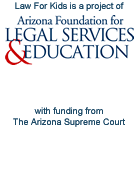 |
Speak Up! - View Question #18552 |
 printer friendly version printer friendly version
Question: My parents were arguing one night and both of them started to get really loud my two little brothers were crying and i never heard them fight like that before i got scared and called the police. well they ended up arresting my dad for disorderly conduct domistic voilance. do i have to testify against him I don't want to because i love him and i don't want him to go to jail. do i have rights
Answer: Unlike communications between a doctor and her patient, a lawyer and his client, or between a husband and wife, children can be called to testify regarding their parents in an overwhelming majority of states (Massachusetts and New York are notable exceptions).
Our legal tradition recognizes the value of keeping certain types of communications private, or privileged. This is because if people thought that someday their doctor or lawyer could be forced to tell their secrets, no one would tell the whole truth about their medical or legal problems, and doctors and lawyers wouldn’t be able to do their jobs very well.
Most states do not recognize a parent-child privilege, but the few that do explain that it is like a combination of the marital privilege between husband and wife (based on love and affection) and the therapist-patient privilege (based on a “listening ear”). Some might additionally explain that the U.S. Constitution protects certain privacy interests in the parent-child relationship. However, in these few states children are usually excused only from testifying about parental communications made in confidence, not unlawful conduct that has been witnessed.
It is much more common for younger children to be excused if they are incompetent to testify. For example, children may be too young to remember events accurately, or they may not fully understand the difference between telling the truth and lying. The Fifth Amendment only provides a right against self-incrimination and is not applicable to your situation because you are not on trial.
As a final practical note, testimony doesn’t have to be “for” or “against” anybody in particular. A witness should just truthfully answer the questions asked of her. An attorney will be representing your father, and at her disposal will be a wide variety of legal defenses. Your testimony is only one part of a large puzzle, and depending on what actually happened and which issues become relevant, some of your truthful testimony could help your father in certain ways.
For more information about child witnesses and anxiety in the courtroom, see “The Child in Court: A Subject Review” published by the American Academy of Pediatrics.
|


















